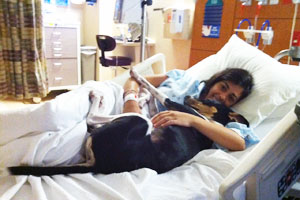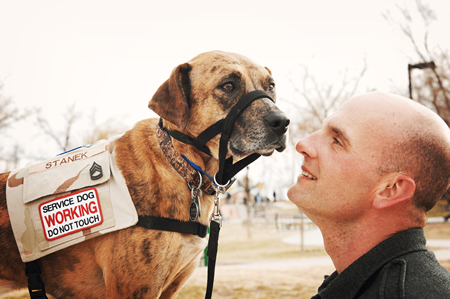Whether you are a veteran returning from a war zone or a civilian who has undergone a traumatic experience, our canine friends have been found to help in dealing with the debilitating struggles.
What Is PTSD

Post Traumatic Stress Disorder or PTSD is believed to effect 8 million adults per year in the United States, while studies have shown that between 7-8 percent of all Americans will experience PTSD at some point during their lives. This number grows to what is estimated that up to 20 percent of those serving in the military will suffer from PTSD at some point during their lives.
What exactly is PTSD? This is how the National Institute of Mental Health defines the disorder:
PTSD is a disorder that develops in some people who have experienced a shocking, scary, or dangerous event.
It is natural to feel afraid during and after a traumatic situation. Fear triggers many split-second changes in the body to help defend against danger or to avoid it. This “fight-or-flight” response is a typical reaction meant to protect a person from harm. Nearly everyone will experience a range of reactions after trauma, yet most people recover from initial symptoms naturally. Those who continue to experience problems may be diagnosed with PTSD. People who have PTSD may feel stressed or frightened even when they are not in danger.
How Dogs Can Help
Some within the medical field have pushed for further funding for those suffering from PTSD to spend time with dogs as a part of their treatment. Groups

such as Canines 4 hope and Paws for Purple Hearts help match dogs with those that they could help with their daily battle in returning to a normal lifestyle.
So how do dogs help?
Psychologists have surmised that canines can help PTSD regain trust, remember feelings of love, and will immediately calm you if you are frightened. For veterans suffering the unconditional love provided by dogs and their protective nature can help the veteran begin adjusting to non combat situations. While some organizations have warned that PTSD victims may not be able to properly care for an animal, the overwhelming majority point to the many benefits provided to both parties.
More Funding Is Needed
While research is still scarce, individual testimony overwhelmingly points to PTSD victims being benefited by service dogs, however the VA (Veterans Affairs) has been extremely reluctant to provide funding. Even going as far as warning those suffering to avoid owning a dog on their official website:
Although people with PTSD who have a service dog for a physical disability or emotional support dog may feel comforted by the animal, there is some chance they may continue to believe that they cannot do certain things on their own. For example, if the dog keeps strangers from coming too close, the owner will not have a chance to learn that they can handle this situation without the dog. Becoming dependent on a dog can get in the way of the recovery process for PTSD. Based on what we know from research, evidence-based treatment provides the best chance of recovery from PTSD.
The VA continues:
Research is underway to better understand if dogs can provide a disability service for persons with PTSD. VA has started a research study to determine if there are things a dog can do for a Veteran with PTSD that would qualify the animal as a Service Dog for PTSD. The study is expected to take several years to complete. The National Center for PTSD is not involved in this study, but we will provide results when they become available.
Finally they end their statement with:
Currently, VA does not provide service dogs for physical or mental health conditions, including PTSD. VA does provide veterinary care for service dogs that are deemed medically necessary for the rehabilitation or restorative care plan of Veterans with permanent physical impairments. If research supports the use of service dogs for PTSD, VA will provide veterinary care for such dogs.
Mental conditions and emotional scars can be just as damaging as permanent physical impairments – while more research should be encouraged, veterans and others suffering from PTSD do not have years to wait. Especially since the VA recognizes that PTSD plays a role in suicide rates among veterans and those suffering trauma:
A body of research indicates that there is a correlation between many types of trauma and suicidal behaviors. For example, there is evidence that traumatic events such as childhood abuse may increase a person’s suicide risk (4,5). A history of military sexual trauma (MST) also increases the risk for suicide and intentional self-harm, suggesting a need to screen for suicide risk in this population (6).
